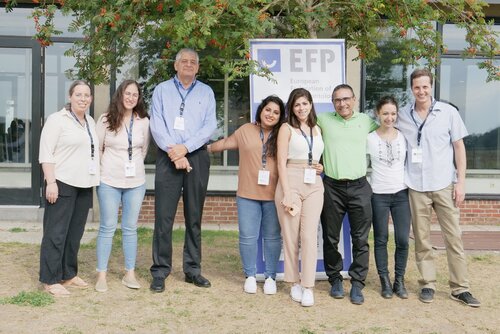![]()
12 September 2022
Postgraduate symposium brought together 19 universities to share research and clinical cases
Category:Education

The ninth EFP Postgraduate Symposium took place from September 1 to 3 in Belgium, bringing together students and lecturers from the federation’s 19 accredited programmes in periodontology.
The effect of non-surgical periodontal therapy on patients with diabetes, the association between periodontal disease and Alzheimer’s disease, and the clinical use of hyaluronic acidwere among the topics covered at the symposium, which took place at the Corsendonk Duinse Polders resort on the coast of Belgium. There was a total of 136 participants, including 94 students and 40 university teachers.
On the first evening, the opening lecture was given by Ubele van der Velden (the original chair of the EFP postgraduate education committee, 1996-2014) who addressed the topic of “Solved and unsolved problems”. This was followed by a presentation by Thaer Sliman, implant product manager at MIS, the event sponsor, and then dinner.
On the Friday and Saturday, after an introductory presentation from Moshe Goldstein (chair of the EFP postgraduate education committee), there were nine research and 10 clinical presentations.
The research presentations were:
- A registry study of furcation involvement and tooth loss, by Anna Trullenque-Eriksson, Sahlgrenska Academy, Gothenburg University (Sweden).
- Hyaluronic acid gel in the management of pain and palatal wound healing after free gingival graft harvesting, by Merve Bacgeroglu, Yeditepe University (Turkey).
- Altered peri-implant immune homeostasis, lessons from the mouse model, by Oded Heyman, Hebrew University Medical Center, Jerusalem (Israel).
- Association of crown emergence angle and profile on dental plaque and inflammation at bone- and tissue-level dental implants, by Bonnie Chin, Hong Kong University (Hong Kong).
- Effects of non-surgical periodontal therapy on the glycaemic variability of periodontal patients with type-1 diabetes: a randomised controlled clinical trial, by Alessandra Bandel, Florence University (Italy).
- GCF biomarker profile of intrabony defects on “hopeless teeth”, by Avinash Patel, King’s College London (UK).
- Influence of local 14% doxycycline hyclate on the deep inflammatory status of periodontal infrabony defects and its effects on periodontal reconstruction outcomes, by Aliyeva Nargiz, University of Turin (Italy).
- How periodontitis or periodontal bacteria can influence Alzheimer’s disease features, by Yaman Al Taep, Liège University (Belgium).
- A randomised controlled trial evaluating hyaluronic acid as wound-healing agent in alveolar ridge preservation, by Julie Ackerman, Ghent University (Belgium).
The clinical presentations were given by Javier Calatrava (Complutense University of Madrid, Spain), Andrea Roccuzzo (University of Bern, Switzerland), Pierre-Yves Gegout (Strasbourg University, France), Yara Saade (Paris-Diderot University, France), Mark Tangri (University College London-Eastman Dental Institute, UK), Georgios Loukas (ACTA, Amsterdam, Netherlands), Eli Regev (Rambam, Haifa, Israel), David Naughton (Trinity College Dublin, Ireland), Moaad Alami (KU Leuven, Belgium), and Ada Lapedra (UIC Barcelona, Spain).
The final session of the postgraduate symposium was dedicated to a lecture on the EFP’s clinical practice guidelines – Concepts, implementation, recommendations, and debates – given by David Herrera (professor of periodontology at the Complutense University of Madrid and chair of the EFP workshop committee).
As well as the group dinners, there was also a teambuilding event on the beach at Blankenberge, which was enjoyed by participants.
“The postgraduate symposium is a special and unique event, which brings together students and teachers from all the accredited programmes,” said Moshe Goldstein, who chaired the symposium – his last symposium as chair of the postgraduate education committee, which will be chaired by Nikos Donos from April next year.
“This was the largest symposium with 136 participants from all the 19 EFP accredited programs. The research-studies reports and the clinical-case presentations showed the high level of postgraduate education in the EFP, and the continuous improvement in scientific activity and clinical performance in these programmes.
“As well as the intense scientific and clinical activity, there was also a very special social one: beach games where the students competed in different tasks. The professional programme, the beach event, and the social interaction during the breaks and meals provided the atmosphere for friendship, communication, and possible future collaborations among the students.”




